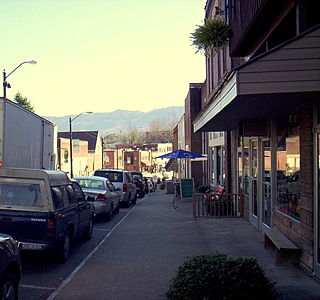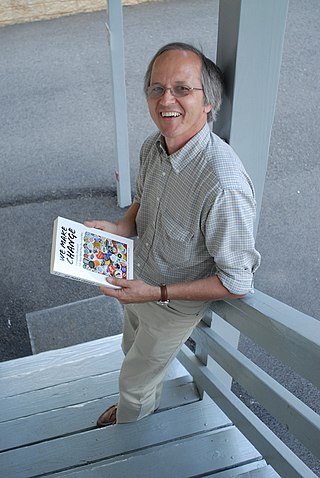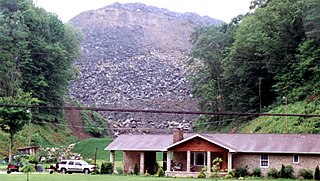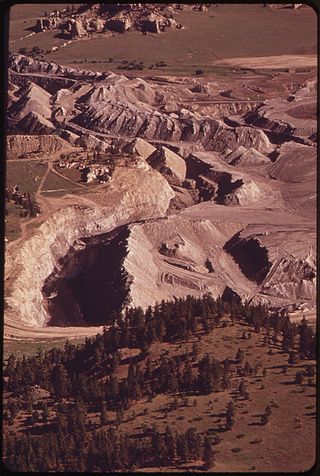
Whitesburg is a home rule-class city in and the county seat of Letcher County, Kentucky, United States. The population was 2,139 at the 2010 census and an estimated 1,875 in 2018. It was named for John D. White, a state politician.

Appalachia is a geographic region located in the central and southern sections of the Appalachian Mountains of the eastern United States. It stretches from the western Catskill Mountains of New York state into Pennsylvania, continuing on through the Blue Ridge Mountains and Great Smoky Mountains into northern Georgia and Alabama. In 2021, the region was home to an estimated 26.3 million people, of whom roughly 80% were white.

Paul Edward Patton is an American politician who served as the 59th governor of Kentucky from 1995 to 2003. Because of a 1992 amendment to the Kentucky Constitution, he was the first governor eligible to run for a second term in office, since James Garrard, in 1800. Since 2013, he has been the chancellor of the University of Pikeville in Pikeville, Kentucky, after serving as its president from 2010 to 2013. He also served as chairman of the Kentucky Council on Postsecondary Education from 2009 to 2011.

Mountaintop removal mining (MTR), also known as mountaintop mining (MTM), is a form of surface mining at the summit or summit ridge of a mountain. Coal seams are extracted from a mountain by removing the land, or overburden, above the seams. This process is considered to be safer compared to underground mining because the coal seams are accessed from above instead of underground. In the United States, this method of coal mining is conducted in the Appalachian Mountains in the eastern United States. Explosives are used to remove up to 400 vertical feet of mountain to expose underlying coal seams. Excess rock and soil is dumped into nearby valleys, in what are called "holler fills" or "valley fills".

Surface mining, including strip mining, open-pit mining and mountaintop removal mining, is a broad category of mining in which soil and rock overlying the mineral deposit are removed, in contrast to underground mining, in which the overlying rock is left in place, and the mineral is removed through shafts or tunnels.
Appalshop is a media, arts, and education center located in Whitesburg, Kentucky, in the heart of the southern Appalachian region of the United States.
James Watson Webb, was an Appalachian poet, playwright, and essayist. He was a founding member of the Appalachian Writers Cooperative and program manager of Appalshop's radio station, WMMT. Webb died on October 22, 2018. WMMT and Appalshop celebrated his life and legacy over the winter of 2018–2019.

Joe Szakos is a community organizer and author. He was coordinator of Kentuckians for the Commonwealth (KFTC) from 1981 to 1993, and was the executive director of Virginia Organizing from 1994 to 2017. After stepping down from the directorship, he became the Lynchburg Chapter organizer until his retirement in November 2020.
Friends of Coal is a 501(c)(6) nonprofit trade group that functions in several states and works closely with state coal trade organizations.
Eula Hall was an Appalachian activist and healthcare pioneer who founded the Mud Creek Clinic in Grethel in Floyd County, Kentucky.
Coal was discovered in Kentucky in 1750. Since the first commercial coal mine opened in 1820 coal has gained both economic importance and controversy regarding its environmental consequences. As of 2010 there were 442 operating coal mines in the state, and as of 2017 there were fewer than 4,000 underground coalminers.
Jeff Chapman-Crane is an Appalachian artist and American realist.
Mountain Justice is a grassroots movement established in 2005 to raise worldwide awareness of mountaintop removal mining and its effects on the environment and peoples of Appalachia. The group seeks to encourage conservation, efficiency, solar and wind energy as alternatives to all forms of surface mining. It self-describes as "a regional Appalachian network committed to ending mountaintop removal". It seeks justice because the mountaintop removal (MTR) it opposes is a form of coal mining known as mountaintop removal mining which produces coal sludge toxic waste which is stored in a dam on the mountain and leaches into the groundwater, which poisons the environment, which defaces the top of the mountain, and which is not stopped due to political corruption.

Environmental justice and coal mining in Appalachia is the study of environmental justice – the interdisciplinary body of social science literature studying theories of the environment and justice; environmental laws, policies, and their implementations and enforcement; development and sustainability; and political ecology – in relation to coal mining in Appalachia.

Environmental issues in Appalachia, a cultural region in the Eastern United States, include long term and ongoing environmental impact from human activity, and specific incidents of environmental harm such as environmental disasters related to mining. A mountainous area with significant coal deposits, many environmental issues in the region are related to coal and gas extraction. Some extraction practices, particularly surface mining, have met significant resistance locally and at times have received international attention.
Helen Matthews Lewis was an American sociologist, historian, and activist who specialized in Appalachia and women's rights. She was noted for developing an interpretation of Appalachia as an internal United States colony, as well as designing the first academic programs for Appalachian studies. She also specialized in Appalachian oral history, collecting and preserving the experiences of Appalachian working-class women in their own words. She is known as the "grandmother of Appalachian Studies" as her work has influenced a generation of scholars who focus on Appalachia.
The Frasure Creek lawsuit was a legal action by environmental organizations Waterkeeper Alliance and Appalachian Voices against Frasure Creek Mining and International Coal Group (ICG) on grounds of falsifying pollution discharge in their reports. This violated many key components of the Clean Water Act (CWA), which controls and regulates many types of pollution entering into waterway. Individual citizens joined the environmental organizations to sue the coal mining companies under the CWA. The Kentucky Energy and Environment Cabinet attempted to settle in Franklin Circuit Court in December, 2010 but was denied. The case moved forward to the Kentucky Supreme Court in April, 2012 who agreed with lower court rulings that Appalachian Voices and others were legally supported by the CWA to intervene in the lawsuit against Frasure Creek Mining and ICG.

The RECLAIM Act was simultaneously introduced in the U.S. Senate and U.S. House of Representatives on March 27, 2017 by Senator Mitch McConnell (R-KY) and Representative Hal Rogers (R-KY-5). The bill authorizes the use of funds generated by Surface Mining Control and Reclamation Act of 1977 (SMCRA) to be invested in communities adversely affected by the cessation of mining operations in the area.
As a legal document, the broad form deed severs a property into surface and mineral rights. This allows other individuals or organizations other than the land owners to purchase rights to resources below the surface. These parties also receive use of surface resources — such as wood or water — to facilitate gathering the resources below ground. Based on English legal theory but an American creation from the early 1900s, the broad form deed was used by land and coal companies in many states within the Appalachian Region.
The Coal Employment Project (CEP) was a non-profit women's organization in the United States from 1977–1996 with the goal of women gaining employment as miners. With local support groups in both the eastern and western coalfields, CEP also advocated for women on issues such as sexual harassment, mine safety, equal access to training and promotions, parental leave, and wages.









